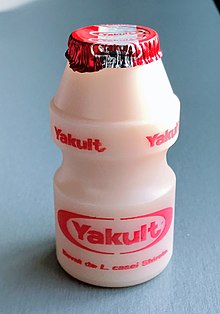
Back معينات حيوية Arabic Probiotiklər AZ Пробиотик Bulgarian প্রোবায়োটিক Bengali/Bangla Probiòtic Catalan Probiotikum Czech Probiotika Danish Probiotikum German Προβιοτικά Greek Probiotic English

Mae Profiotigion yn ficro-organebau byw sydd i fod i ddarparu buddion iechyd wrth eu bwyta, yn gyffredinol trwy wella neu adfer fflora'r perfedd .[1][2][3][4] Mae profiotegau yn cael eu hystyried yn ddiogel i'w bwyta ar y cyfan, ond gallant achosi rhyngweithio rhwng bacteria letyol a sgil-effeithiau diangen mewn achosion prin.[5][6][7]
Priodolir y theori wreiddiol, sy'n debyg i'r cysyniad modern, ond nid y term, i'r llawryfwr Nobel Élie Metchnikoff, a nododd fod gwerinwyr Bwlgaria oedd yn bwyta iogwrt yn byw bywydau hirach oherwydd yr arferiad hwnnw.[8]
Mae marchnad profiotigion gynyddol wedi arwain at yr angen am ofynion llymach ar gyfer prawf gwyddonol o'r buddion tybiedig a roddir gan y micro-organebau yr honnir eu bod mewn profiotig.[3] Er bod nifer o fuddion honedig yn cael eu defnyddio i farchnata cynhyrchion profiotig i ddefnyddwyr, megis lleihau anghysur gastroberfeddol, gwella iechyd imiwnedd,[9] lleddfu rhwymedd, neu osgoi'r annwyd cyffredin, nid yw tystiolaeth wyddonol yn cefnogi honiadau o'r fath.[10][11] Mae'r fath honiadau yn cael eu gwahardd fel hysbysebu twyllodrus yn yr Unol Daleithiau gan y Comisiwn Masnach Ffederal .[12] Ers 2019 mae nifer o geisiadau am gymeradwyaeth hawliadau iechyd gan wneuthurwyr Ewropeaidd o atchwanegiadau dietegol profiotig wedi'u gwrthod gan Awdurdod Diogelwch Bwyd Ewrop o herwydd tystiolaeth annigonol o fecanwaith neu effeithiolrwydd buddiol.[13]
- ↑ "Probiotics: In Depth". National Center for Complementary and Integrative Health, US National Institutes of Health. 31 July 2018. Archifwyd o'r gwreiddiol ar 17 September 2018. Cyrchwyd 16 September 2018.
- ↑ Hill, C; Guarner, F; Reid, G; Gibson, GR; Merenstein, DJ; Pot, B; Morelli, L; Canani, RB et al. (August 2014). "Expert consensus document. The International Scientific Association for Probiotics and Prebiotics consensus statement on the scope and appropriate use of the term probiotic.". Nature Reviews. Gastroenterology & Hepatology 11 (8): 506–14. doi:10.1038/nrgastro.2014.66. PMID 24912386.
- ↑ 3.0 3.1 "Health benefits and health claims of probiotics: Bridging science and marketing". British Journal of Nutrition 106 (9): 1291–6. 2011. doi:10.1017/S000711451100287X. PMID 21861940.
- ↑ Magdalena Araya, Catherine Stanton, Lorenzo Morelli, Gregor Reid, Maya Pineiro, et al., 2006, "Probiotics in food: health and nutritional properties and guidelines for evaluation," Combined Report of a Joint FAO/WHO Expert Consultation on Evaluation of Health and Nutritional Properties of Probiotics in Food Including Powder Milk with Live Lactic Acid Bacteria, Cordoba, Argentina, 1–4 October 2001, and Report of a Joint FAO/WHO Working Group on Drafting Guidelines for the Evaluation of Probiotics in Food, London, Ontario, Canada, 30 April–1 May 2002 [FAO Food and Nutrition paper 85], pp. 1–50, Rome, Italy:World Health Organization (WHO), Food and Agriculture Organization (FAO) [of the United Nations], ISBN 9251055130, see, accessed 11 June 2015.
- ↑ "Risk and safety of probiotics.". Clin Infect Dis 60 Suppl 2: S129–34. 2015. doi:10.1093/cid/civ085. PMC 4490230. PMID 25922398. http://cid.oxfordjournals.org/content/60/suppl_2/S129.long. Adalwyd 2016-06-04.
- ↑ "Probiotics in critically ill children.". F1000Res 5: 407. 2016. doi:10.12688/f1000research.7630.1. PMC 4813632. PMID 27081478. http://www.pubmedcentral.nih.gov/articlerender.fcgi?tool=pmcentrez&artid=4813632.
- ↑ "Diet therapy for inflammatory bowel diseases: The established and the new.". World J Gastroenterol 22 (7): 2179–94. 2016. doi:10.3748/wjg.v22.i7.2179. PMC 4734995. PMID 26900283. http://www.pubmedcentral.nih.gov/articlerender.fcgi?tool=pmcentrez&artid=4734995.
- ↑ Brown, Amy C.; Valiere, Ana (2004-01-01). "Probiotics and Medical Nutrition Therapy". Nutrition in Clinical Care 7 (2): 56–68. ISSN 1096-6781. PMC 1482314. PMID 15481739. http://www.pubmedcentral.nih.gov/articlerender.fcgi?tool=pmcentrez&artid=1482314.
- ↑ Turck, Dominique; Castenmiller, Jacqueline; De Henauw, Stefaan; Hirsch‐Ernst, Karen Ildico; Kearney, John; Knutsen, Helle Katrine; MacIuk, Alexandre; Mangelsdorf, Inge et al. (15 April 2019). "Nutrimune and immune defence against pathogens in the gastrointestinal and upper respiratory tracts: evaluation of a health claim pursuant to Article 14 of Regulation (EC) No 1924/2006". EFSA Journal (European Food Safety Authority, Panel on Nutrition, Novel Foods and Food Allergens) 17 (4). doi:10.2903/j.efsa.2019.5656.
- ↑ ""Snake-oil," "quack medicine," and "industrially cultured organisms:" biovalue and the commercialization of human microbiome research". BMC Medical Ethics 13: 28. 2012. doi:10.1186/1472-6939-13-28. PMC 3512494. PMID 23110633. http://www.pubmedcentral.nih.gov/articlerender.fcgi?tool=pmcentrez&artid=3512494.
- ↑ "Warning letter to CocoKefir LLC". Compliance Branch, Inspections, Compliance, Enforcement, and Criminal Investigations, US Food and Drug Administration and Federal Trade Commission. 22 November 2011. Archifwyd o'r gwreiddiol ar 23 October 2016. Cyrchwyd 4 June 2016.
- ↑ "Dannon Agrees to Drop Exaggerated Health Claims for Activia Yogurt and DanActive Dairy Drink FTC Charges that Evidence Supporting Benefits of Probiotics Falls Short". Federal Trade Commission, US Government. 15 December 2010. Archifwyd o'r gwreiddiol ar 14 May 2017. Cyrchwyd 9 May 2017.
- ↑ Will Chu (18 April 2019). "Heinz reels from latest probiotic health claim rejection by EFSA". NutraIngredients.com, William Reed Business Media Ltd. Cyrchwyd 11 May 2019.